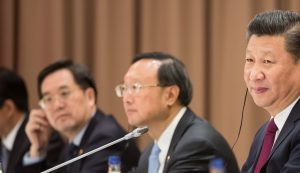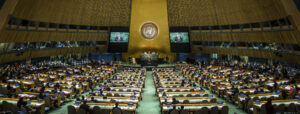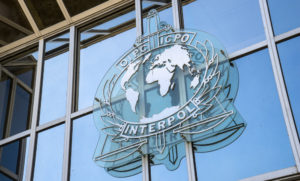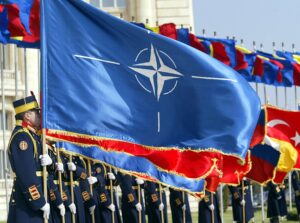April 2024, Volume 35, Issue 2
Why Autocracies Fear LGBTQ+ Rights
The battle over rights for sexual minorities has divided countries into opposing camps. But autocrats are lashing out with one aim: countering the liberal international order.
April 2024, Volume 35, Issue 2
The battle over rights for sexual minorities has divided countries into opposing camps. But autocrats are lashing out with one aim: countering the liberal international order.


July 2021, Volume 32, Issue 3
Beijing is using red tape, procedural rules, and a little help from its authoritarian allies to strangle NGOs seeking to participate in the world body.


October 2020, Volume 31, Issue 4
Through greater savvy engagement with international law, authoritarians are seeking not only to shield themselves from criticism, but to reshape global norms in their favor.


April 2019, Volume 30, Issue 2
Globalized authoritarian regimes are increasingly abusing Interpol’s notice system to go after political opponents based abroad. These regimes seek not only to punish their critics, but also to legitimate their own acts of repression.

October 2018, Volume 29, Issue 4
Taking advantage of broad global respect for regionalism, authoritarian regimes are using their own regional organizations to bolster fellow autocracies. These groupings offer a mechanism for lending legitimacy, redistributing resources, and insulating members from democratic influences.
April 2018, Volume 29, Issue 2
China has emerged as a key player in development assistance, challenging the mainstream development community’s emphasis on good governance.
January 2018, Volume 29, Issue 1
Central African autocrats are using their stolen money to outmaneuver their opponents and deflect international criticism.
January 2017, Volume 28, Issue 1
The Editors’ introduction to “Britain After Brexit.”

January 2017, Volume 28, Issue 1
The referendum campaign and its aftermath have exposed fault lines between the “two Britains” that have been long in the making and that pose stark questions about national values and identity.
January 2017, Volume 28, Issue 1
Following the end of the Cold War, an international norm against coups began gaining strength, but it seems to have lost momentum in recent years. What has happened?

July 2015, Volume 26, Issue 3
A few years ago, Europe’s most important intergovernmental human-rights institution, the Council of Europe, crossed over to the dark side. Like Dorian Gray, the dandy in Oscar Wilde’s story of moral decay, it sold its soul. And as with Dorian Gray, who retained his good looks, the inner decay of the Council of Europe remains hidden from view.
October 2014, Volume 25, Issue 4
The European Parliament elections of May 2014 were not an “earthquake,” but they did signal that Euroskeptic parties are drawing closer to the European political mainstream.
October 2014, Volume 25, Issue 4
Disagreements over how much power should reside in Brussels must be allowed to become a normal aspect of debates about European affairs.
July 2013, Volume 24, Issue 3
The widely hailed writings of Singapore’s Kishore Mahbubani, including his latest book, The Great Convergence: Asia, the West, and the Logic of One World, reveal a remarkably narrow and Manichean worldview.
July 2012, Volume 23, Issue 3
Can outside actors help Hungarians to loosen Fidesz’s centralized grip on all of their country’s governing institutions?
January 2011, Volume 22, Issue 1
The financial crisis did not deal a fatal blow to any democracies, but it did hasten an erosion of the influence of the West. In the future, the balance of power among competing regime types may be decided by the emerging-market democracies.
July 2010, Volume 21, Issue 3
Why do election monitors sometimes issue contradictory statements or endorse flawed elections? The answers are not always straightforward; in some cases, the monitors’ good intentions may undermine their credibility.
April 2010, Volume 21, Issue 2
In emerging democracies and postconflict countries, improved policing is almost always urgently required. Yet international-assistance efforts in this area pay almost no attention to the crucial need to ensure that the new-model police are not only effective, but democracy-friendly.
January 2010, Volume 21, Issue 1
A coauthor of the pathbreaking study Transitions from Authoritarian Rule reflects on the lessons that he has learned about democratic transition and consolidation since the publication of this work nearly 25 years ago.
January 2010, Volume 21, Issue 1
In the twenty years since 1989, acute excitement over democratic transition and consolidation gave way to symptoms of “democracy fatigue” and elite exhaustion; successful economic transition away from state socialism fell victim to a crisis of the free-market model; and the EU’s transformative power has reached its geopolitical limits. The nations of Central and Eastern…
October 2009, Volume 20, Issue 4
The countries of Central and Eastern Europe have been struggling to devise approaches to political economy that can bring stability, prosperity, and a measure of equality in a world dominated by global finance and exchange.
July 2009, Volume 20, Issue 3
In April 2008, disputed election results in the tiny state of Moldova sparked violent protests and a harsh response from state authorities.
July 2009, Volume 20, Issue 3
A review of Freedom’s Battle: The Origins of Humanitarian Intervention by Gary J. Bass.
April 2009, Volume 20, Issue 2
The North Atlantic Treaty Organization played a key role in safeguarding Western democracy during the Cold War. With that conflict over, NATO must continually adapt and evolve in a fast-changing world.
April 2009, Volume 20, Issue 2
In February 2008, Kosovo broke away from Serbia and declared its independence. But to what extent is it making progress toward its goals of sovereignty and democracy?
January 2009, Volume 20, Issue 1
Western pressure can be decisive, but it is not always easy to forecast when and how it will be applied.
July 2008, Volume 19, Issue 3
Can regionalism help to redress the uneven spread and internal weaknesses of democracy in Southeast Asia? Unforeseen events in the region and positive political entrepreneurship may yet transform ASEAN into a force for democracy.
January 2005, Volume 16, Issue 1
In the conditions of today's world, countries that are in a bad way as regards some aspects of their governance may benefit from agreeing to share portions of their sovereignty with external actors.
January 2005, Volume 16, Issue 1
Like many other world-government bodies, the International Monetary Fund is a necessarily nondemocratic organitzation that cannot help but have an impact on democracy’s prospects in poorer countries.
January 2005, Volume 16, Issue 1
Modest progress in the muslim-majority countries is complemented by mass mobilization for democracy and freedom in Ukraine. Meanwhile, Russia ranks as Not Free for the first time since the fall of communism.

July 2003, Volume 14, Issue 3
Like liberals in the British East India Company more than a century ago, European and international officials have become stewards of a people's fate. The intentions are good, but will self-government result?
January 2002, Volume 13, Issue 1
The United Nations did superb work in helping Mozambique to end its long-festering civil war and start down the path to recovery, but those gains could slip away amid ominous conditions of partisan polarization, excessive political centralization, and a winner-takes-everything electoral system.
October 2001, Volume 12, Issue 4
In Peru in 2000, the OAS made an unprecedented diplomatic intervention in a member state. Could this be a model for the future?
October 2001, Volume 12, Issue 4
Although the OAS helped, sudden public revelations of corruption in Peru were more important.
July 2001, Volume 12, Issue 3
The evidence clearly points to the growing incorporation into international law of the right to democratic governance.
July 2000, Volume 11, Issue 3
The promotion of democracy in Africa has become the dominant theme of South Africa’s foreign policy. Yet the dilemmas this policy has confronted in practice have forced the government to alter its approach.
April 2000, Volume 11, Issue 2
Nowhere else has the impact of international factors on democratization been as apparent as in Central and Eastern Europe. Integration into European and Euro-Atlantic structures is one particularly strong democratizing force.
January 1999, Volume 10, Issue 1
Read the full essay here.
April 1998, Volume 9, Issue 2
Read the full essay here.
July 1997, Volume 8, Issue 3
Read the full essay here.
July 1997, Volume 8, Issue 3
Read the full essay here.
January 1994, Volume 5, Issue 1
Read the full essay here.
July 1993, Volume 4, Issue 3
The Editors’ introduction to “International Organizations & Democracy.”
July 1993, Volume 4, Issue 3
Read the full essay here.
July 1993, Volume 4, Issue 3
Read the full essay here.
July 1993, Volume 4, Issue 3
Read the full essay here.
July 1993, Volume 4, Issue 3
Read the full essay here.
July 1993, Volume 4, Issue 3
Read the full essay here.
July 1993, Volume 4, Issue 3
Read the full essay here.

The far-right AfD surged ahead in the European Union elections. It is now one of Germany’s dominant parties, and not just part of the fringe.

On its 75th anniversary, the Atlantic Alliance should be celebrated for being more than the world’s greatest military compact. It’s an engine of democracy’s advance.